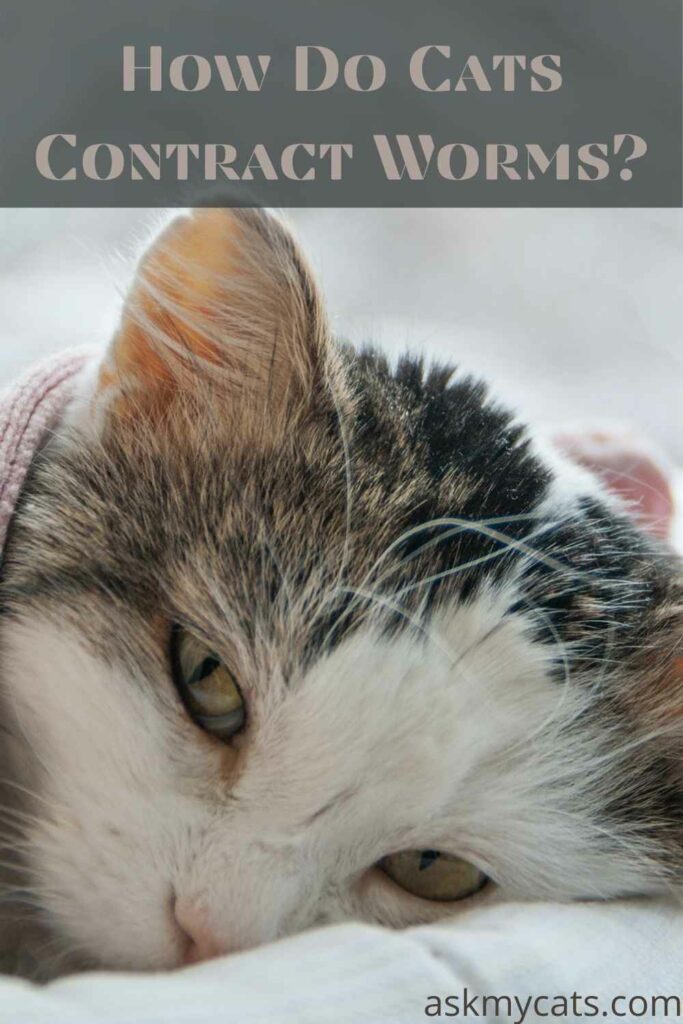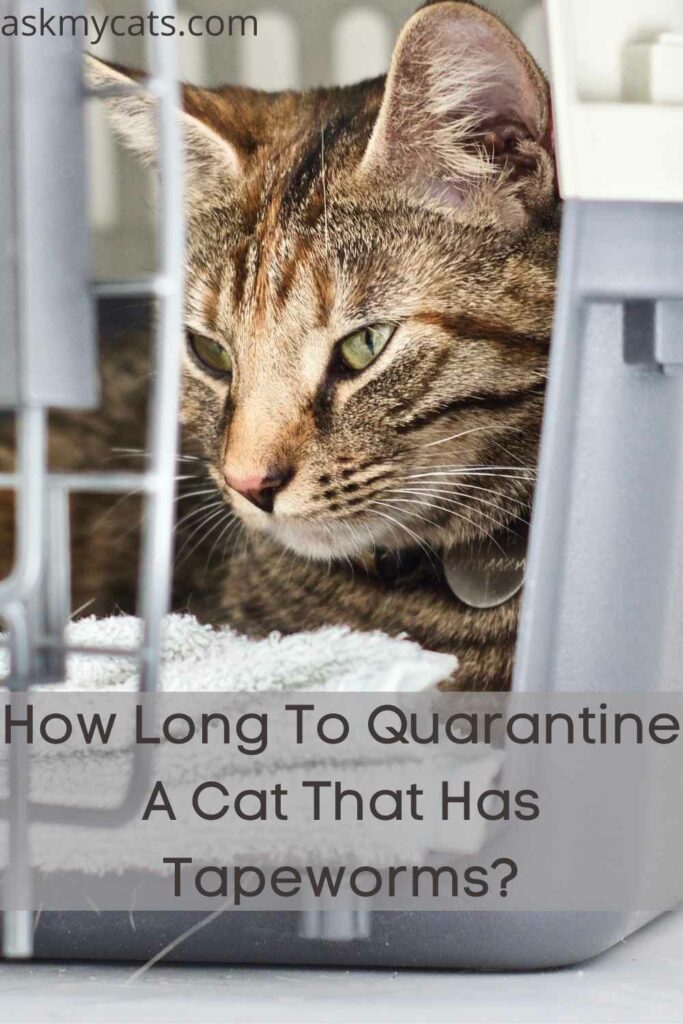Each of us, cat owners, has to come face to face with worms that are infecting our cat at some point in time.
One of the most frequent questions regarding worms is whether you should quarantine your cat or not.
If your cat has tapeworms, treat them with a dewormer and quarantine them for a few days. If you have other cats or dogs in the house, the quarantine may need to be extended because tapeworms are very easy to transmit through fleas.


Give Your Cat the Perfect Day
Get the Free Ebook!
How Do Cats Contract Worms?
Cats can contract worms from fleas, from hunting, from mother’s milk, From larvae, and from eating worm eggs released an infected animal’s feces.

Roundworm-infested cats pass tiny eggs in their feces. These eggs can seep into the environment, such as your garden soil, where they can thrive for years.
If your cat consumes these eggs by accident, such as by walking over infected ground and then grooming and licking its feet, a new roundworm illness might develop.
Eggs on the ground hatch in the case of hookworm, releasing larvae that could be ingested by your cat and cause a hookworm infection.
Cats most commonly acquire tapeworms by ingesting infected fleas carrying the larval form of the worm.
A cat is thought to eat about half of any fleas present during brushing, so fleas carrying tapeworm larvae are likely to end up in their intestines.
The larval stages of roundworms, hookworms, and tapeworms can infect rodents, birds, lizards, and other small animals. Cats can become sick if they eat all or part of these animals while hunting or scavenging.
Unfortunately, infected moms can spread roundworm larvae to their kittens through their milk, making it simple for kittens to develop worms before they leave the safety of their homes.
This is especially dangerous for kittens since they are so young and delicate, causing diarrhea, vomiting, and poor weight gain.
In the case of hookworm, the larvae can travel through the skin to reach deeper tissues once the eggs on the ground hatch.
Keeping your cat on a regular worming plan can prevent health problems and pain. While there are various worming treatments available, a spot-on wormer like Profender Allwormer (link) makes worming less stressful.
It’s simple to use, safe for kittens as young as eight weeks old, and weighing at least 2.5kg, and it kills every form of intestinal worm known in cats.
Also, you might like to read about how much is it to deworm a cat
What Are Tapeworms?
Tapeworms are long, flat worms with a large number of segments. The tapeworm’s mature segments, which contain eggs, are discharged and passed in the feces.
These segments, which resemble rice grains, can be found in the cat’s hair near the anus, in the feces, and on the cat’s bed.
All tapeworms require an intermediate host to complete their life cycle. The intermediate host must first ingest the eggs from the environment, and then the cat must eat the intermediate host to become infected.
Depending on the tapeworm type, different animals serve as intermediary hosts. Dipylidium caninum and Taenia taeniaeformis are the most frequent tapeworms found in cats around the world.
Cats get infected with Dipylidium caninum, which is spread by fleas. Immature flea larvae consume the worm’s eggs, but illness is passed on to a cat when it eats an infected flea during grooming.
It should be assumed that any cat infected with fleas also has Dipylidium caninum and vice versa.
When they eat small rodents (rats and mice), Taenia taeniaeformis is passed on, with the rodents having eaten eggs from the environment. This illness is pretty frequent in hunting cats.
You must like to read about are worms in cats deadly
How Long To Quarantine A Cat That Has Tapeworms?
If your cat is infected with tapeworms, start the deworming procedure and quarantine her for some days. It is necessary to quarantine your cat as other pets in the house could be infected by tapeworms which can transmit via fleas.

It’s critical to choose the correct dewormer to get rid of those bothersome parasites.
We strongly advise you to see a trained veterinarian, as he will be able to provide you with better advice on this matter.
If you choose to use an over-the-counter tapeworm dewormer, be sure to read the instructions and information on the bottle carefully.
This is because deworming medications are only effective against certain parasites, so you want to ensure you’re going for the proper one.
Cat owners must understand that not all anthelmintics are effective against all parasites.
There is no one-size-fits-all remedy for all parasite problems in cats.
Some classes are especially effective against roundworms, while others are expressly designed to combat tapeworms.
Using the wrong type of dewormer on your cats can cause more harm than benefit. As a result, rather than attempting to self-medicate your cat’s parasite diseases, we strongly suggest you consult your veterinarian.
Age, breed gender, and reproductive state are all aspects to consider when determining which deworming agent to use.
Below are the four main types of deworming agents for cats:
- Tetrahydropyrimidines
- Prazion-izoquinolines
- Macrocyclic Lactones
- Benzimidazoles
You might also like to read about home remedies for worms in cats
How Long To Keep Cats Separated After Deworming?
The length of time you should separate cats after deworming is determined by the type of worm your cat has and the medication used to treat it. It would be best to keep your cats apart until the parasite-affected cat is completely clear of parasites.

If you suspect your cat has worms, you should treat it right away because it can lead to serious medical problems and health problems if left untreated.
It’s critical to discuss preventative measures with your veterinarian. This will assist you in recognizing the signs of worms in cats.
After deworming, keep your cats apart because parasites can still be spread between cats, even if they are being treated.
Some treatments take days, if not weeks, to completely eliminate the parasite from the cat’s system.
Even if your cats are being treated, there is still the possibility that they will infect your healthy cats.
Depending on your veterinarian’s instructions, it’s best to keep them apart.
Even if your diseased cat is on treatment, keeping your healthy cat away from your infected cat is critical. This is because the parasite’s length of time to clear from an infected cat’s system is determined by the type of worm and the treatment’s efficiency.
Some treatments can get rid of parasites in as little as 24 hours, while others take weeks to work. Make sure you read the deworming directions on your cat’s medicine.
Also, ask your veterinarian about the best course of action, as some cats may be allergic to certain drug ingredients.
When taken as directed, deworming drugs are generally safe and rarely cause adverse effects. Vomiting, diarrhea, excessive drooling, and hair loss at the location of topical medicine application are the most prevalent side effects.
If the negative effects are causing you concern, you can always take your cat to the veterinarian for an examination.
The length of time you must separate your cats while one is being dewormed is determined by the type of worm and the therapy prescribed by your veterinarian.
It’s critical to keep your healthy cats away from your diseased cat, even if they’re on treatment because your infected cat can still spread the infection onto your healthy cats.
While some worms can be treated in as little as a day or two, others require three or four weeks of treatment to be entirely removed.
You might find it interesting to know can i get worms from my cat sleeping in my bed
How Long After Deworming A Cat Are The Worms Gone?
The time it takes for worms to complete get eradicated after deworming a cat depends upon the severity of the infection and the effectiveness of the treatment. Some take 24 hours, while others can take up several weeks.
When it comes to killing worms and their eggs and larvae, there are various options, ranging from natural therapies to prescription drugs.
Never utilize leftover medicines to treat a new infection since the treatment procedure used to treat one type of worm won’t work on another.
The type of worms your cat has and the treatment choice your veterinarian recommends will determine how long it takes him to recover.
The majority of drugs take a few days to take action. The vet may advise you to continue feeding these doses to your cat for up to two weeks to ensure that the parasites have wholly vanished from your sight.
If feasible, a follow-up exam should be performed three or four weeks after therapy to ensure that your cat is worm-free.
Also, check out about my cat has worms how do i clean my house
How Do Wormers Take Effect?
Wormers work as anti-parasitic agents, removing worm eggs or larvae from the body and passing them out with feces. However, unlike immunization, wormers are only effective in eliminating active worms and do not prevent worm re-infection.
Most drugs can kill adult worms within 24 hours after taking them. In some rare circumstances, a second dosage administered 3 to 4 weeks later is required to kill the remaining larvae at the time of therapy.
In general, a cat’s chances of contracting worms again after taking a deworming dose are high. The worms in the cat’s body require around three months to develop and reproduce to the point where they harm the cat’s health.
Because cats are such good hunters, the time it takes for the worms to disappear after deworming is shortened to two months.
Deworming kittens should be done every two weeks from the age of six weeks to three months, then monthly until they reach the age of six months.
Deworming therapy should be given to kittens aged 6 to 12 months every three months. Intervals of three to six months are sufficient for older individuals.
You must read about what to expect after deworming a cat
How To Minimize Risk Of Re-Infection In Cats?
Here are some tips to minimize the risk of re-infection in cats: –
- After deworming, be cautious when cleaning up cat excrement to avoid becoming infected with worm larvae. Also, after you’ve played with him, remember to wash your hands.
- Follow a year-round flea prevention strategy that includes oral dosages, collars, and topical applications.
- Empty and disinfect your pet’s litter box and water and food dishes on a regular basis.
- Keep your cat inside so he won’t be able to hunt or consume contaminated rodents. If at all feasible, request that the veterinarian prescribe a worm-prevention tablet.
- To get rid of fleas, wash all of your cat’s favorite blankets and pillows, vacuum your carpets periodically, and pick up organic material like clippings, straws, and leaves. Please pay special attention to dark, shady, and moist locations since they provide ideal breeding and growth conditions for fleas.
Frequently Asked Question
What is the most dangerous worm my cat could get?
Ans. Hookworms are considered the most dangerous worms that could be found in a cat because of the risk of intestinal bleeding. Fortunately, unlike other forms of worms, this parasite is less common in cats.
Should the whole house be cleaned after deworming a cat?
Ans. Cleaning the entire house after deworming a cat is highly recommended as this will significantly lower the chances of your cat getting reinfected by the worms.
Can dewormers prevent my cat from getting reinfected by worms?
Ans. No, dewormers cannot prevent your cat from getting reinfected by worms as, unlike vaccines, wormers are only effective in eliminating active worms and do not prevent worm re-infection.
Final Words
The length of time you must isolate your cat is determined by the type of worm and the therapy prescribed by your veterinarian.
Worm infection is a major source of concern for all cat owners. Instant deworming treatment is unquestionably necessary to prevent further major health complications for the cat and your household.
Interesting Read: Can You Vaccinate A Pregnant Cat?
